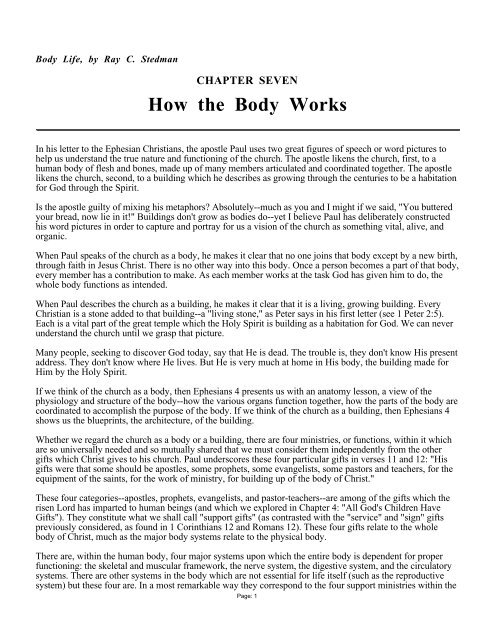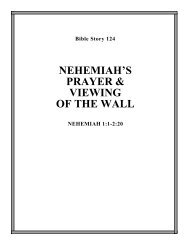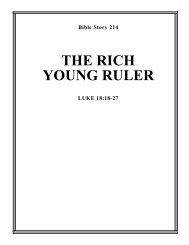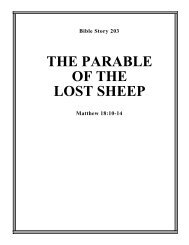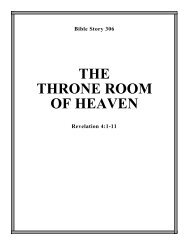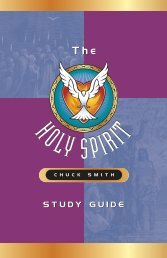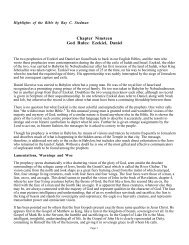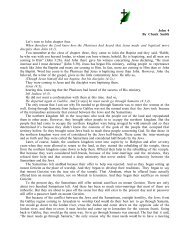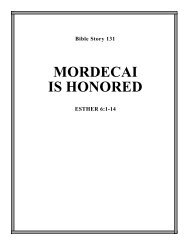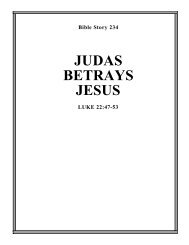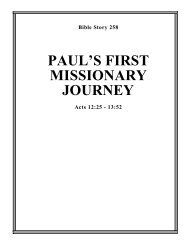Netscape: How the Body Works
Netscape: How the Body Works
Netscape: How the Body Works
Create successful ePaper yourself
Turn your PDF publications into a flip-book with our unique Google optimized e-Paper software.
<strong>Body</strong> Life, by Ray C. StedmanCHAPTER SEVEN<strong>How</strong> <strong>the</strong> <strong>Body</strong> <strong>Works</strong>In his letter to <strong>the</strong> Ephesian Christians, <strong>the</strong> apostle Paul uses two great figures of speech or word pictures tohelp us understand <strong>the</strong> true nature and functioning of <strong>the</strong> church. The apostle likens <strong>the</strong> church, first, to ahuman body of flesh and bones, made up of many members articulated and coordinated toge<strong>the</strong>r. The apostlelikens <strong>the</strong> church, second, to a building which he describes as growing through <strong>the</strong> centuries to be a habitationfor God through <strong>the</strong> Spirit.Is <strong>the</strong> apostle guilty of mixing his metaphors? Absolutely--much as you and I might if we said, "You butteredyour bread, now lie in it!" Buildings don't grow as bodies do--yet I believe Paul has deliberately constructedhis word pictures in order to capture and portray for us a vision of <strong>the</strong> church as something vital, alive, andorganic.When Paul speaks of <strong>the</strong> church as a body, he makes it clear that no one joins that body except by a new birth,through faith in Jesus Christ. There is no o<strong>the</strong>r way into this body. Once a person becomes a part of that body,every member has a contribution to make. As each member works at <strong>the</strong> task God has given him to do, <strong>the</strong>whole body functions as intended.When Paul describes <strong>the</strong> church as a building, he makes it clear that it is a living, growing building. EveryChristian is a stone added to that building--a "living stone," as Peter says in his first letter (see 1 Peter 2:5).Each is a vital part of <strong>the</strong> great temple which <strong>the</strong> Holy Spirit is building as a habitation for God. We can neverunderstand <strong>the</strong> church until we grasp that picture.Many people, seeking to discover God today, say that He is dead. The trouble is, <strong>the</strong>y don't know His presentaddress. They don't know where He lives. But He is very much at home in His body, <strong>the</strong> building made forHim by <strong>the</strong> Holy Spirit.If we think of <strong>the</strong> church as a body, <strong>the</strong>n Ephesians 4 presents us with an anatomy lesson, a view of <strong>the</strong>physiology and structure of <strong>the</strong> body--how <strong>the</strong> various organs function toge<strong>the</strong>r, how <strong>the</strong> parts of <strong>the</strong> body arecoordinated to accomplish <strong>the</strong> purpose of <strong>the</strong> body. If we think of <strong>the</strong> church as a building, <strong>the</strong>n Ephesians 4shows us <strong>the</strong> blueprints, <strong>the</strong> architecture, of <strong>the</strong> building.Whe<strong>the</strong>r we regard <strong>the</strong> church as a body or a building, <strong>the</strong>re are four ministries, or functions, within it whichare so universally needed and so mutually shared that we must consider <strong>the</strong>m independently from <strong>the</strong> o<strong>the</strong>rgifts which Christ gives to his church. Paul underscores <strong>the</strong>se four particular gifts in verses 11 and 12: "Hisgifts were that some should be apostles, some prophets, some evangelists, some pastors and teachers, for <strong>the</strong>equipment of <strong>the</strong> saints, for <strong>the</strong> work of ministry, for building up of <strong>the</strong> body of Christ."These four categories--apostles, prophets, evangelists, and pastor-teachers--are among of <strong>the</strong> gifts which <strong>the</strong>risen Lord has imparted to human beings (and which we explored in Chapter 4: "All God's Children HaveGifts"). They constitute what we shall call "support gifts" (as contrasted with <strong>the</strong> "service" and "sign" giftspreviously considered, as found in 1 Corinthians 12 and Romans 12). These four gifts relate to <strong>the</strong> wholebody of Christ, much as <strong>the</strong> major body systems relate to <strong>the</strong> physical body.There are, within <strong>the</strong> human body, four major systems upon which <strong>the</strong> entire body is dependent for properfunctioning: <strong>the</strong> skeletal and muscular framework, <strong>the</strong> nerve system, <strong>the</strong> digestive system, and <strong>the</strong> circulatorysystems. There are o<strong>the</strong>r systems in <strong>the</strong> body which are not essential for life itself (such as <strong>the</strong> reproductivesystem) but <strong>the</strong>se four are. In a most remarkable way <strong>the</strong>y correspond to <strong>the</strong> four support ministries within <strong>the</strong>Page: 1
ody of Christ:1. "Bones and muscles"--<strong>the</strong> gift of apostlesFirst, <strong>the</strong>re is <strong>the</strong> basic structural system of bones and muscles. This gives <strong>the</strong> body its fundamental supportand makes possible our mobility and activity. We would all be nothing but rolling, shapeless globs of gelatin ifit were not for our bones and muscles! This image clearly corresponds to <strong>the</strong> apostles and <strong>the</strong>ir function in <strong>the</strong>body of Christ. Their work was foundational, skeletal. They formed <strong>the</strong> basic structure which made <strong>the</strong> bodyof Christ assume <strong>the</strong> particular form it has.To revert for a moment to <strong>the</strong> figure of <strong>the</strong> church as a building, <strong>the</strong>re is a clear word from <strong>the</strong> apostle Paulconcerning <strong>the</strong> function of <strong>the</strong> apostles and prophets. In Ephesians 2:10 and 20, he says, "So <strong>the</strong>n you are nolonger strangers and sojourners, but you are fellow citizens with <strong>the</strong> saints and members of <strong>the</strong> household ofGod, built upon <strong>the</strong> foundation of <strong>the</strong> apostles and prophets, Christ Jesus himself being <strong>the</strong> cornerstone."The foundation of <strong>the</strong> church is Jesus Christ, as Paul declared to <strong>the</strong> Corinthians, "For no o<strong>the</strong>r foundation cananyone lay than that which is laid, which is Jesus Christ" (1 Cor. 3:11), and <strong>the</strong> primary work of an apostlewas to declare <strong>the</strong> whole body of truth concerning Jesus Christ. That is <strong>the</strong> foundation. What <strong>the</strong> apostles sayabout Jesus Christ is <strong>the</strong> foundation of <strong>the</strong> church, and what <strong>the</strong>y said about Jesus Christ is recorded for us in<strong>the</strong> New Testament. That book is written by <strong>the</strong> apostles and prophets, and <strong>the</strong> church rests squarely upon thatfoundation.<strong>How</strong> does one get into <strong>the</strong> church? By believing <strong>the</strong> truth about Jesus Christ (and believing means more thanintellectual assent--it is a commitment of <strong>the</strong> will as well). It is only as <strong>the</strong> church rests upon this foundation of<strong>the</strong> faith, as taught by <strong>the</strong> apostles, that <strong>the</strong>re is any certainty or strength. Today many are straying from <strong>the</strong>foundation and as a result <strong>the</strong>y have lost any note of authority or assurance. Merely human view-points oropinions do not change <strong>the</strong> foundation. Modern knowledge and <strong>the</strong> discoveries of science will never alter it.Our ultimate concern is what <strong>the</strong> apostles taught. That is <strong>the</strong> greatest revelation of reality we possess, "<strong>the</strong> truth[as it] is in Jesus" (Eph. 4:21).People in <strong>the</strong> construction business know that a foundation is of <strong>the</strong> utmost importance. You do not take risksor shortcuts with a foundation. You lay it squarely, securely, and strongly, for <strong>the</strong> whole building is going torest on that foundation and will derive its strength from <strong>the</strong> character of <strong>the</strong> foundation. The same is true of <strong>the</strong>church.The Lord Jesus made very clear that if a man builds on <strong>the</strong> wrong foundation, he is in trouble. One man maybuild his house on <strong>the</strong> sand and <strong>the</strong> house may look very beautiful and impressive, but when <strong>the</strong> storms come,it falls. Ano<strong>the</strong>r man may build on <strong>the</strong> rock and his house will stand in <strong>the</strong> storm. It is <strong>the</strong> foundation whichmakes all <strong>the</strong> difference.Jesus himself is <strong>the</strong> one who named <strong>the</strong> apostles. We have <strong>the</strong> record in <strong>the</strong> Gospels of <strong>the</strong> Lord calling twelvemen to be "with him." That was <strong>the</strong>ir primary characteristic as apostles, men who had been with Jesus. Hesent <strong>the</strong>m out in a specialized ministry. (The word "apostle" means one sent out or one sent forth.) The Twelvehad a special commission and a special authority. As you follow <strong>the</strong>ir ministry you recognize that <strong>the</strong>ypossessed an authoritative word. Wherever <strong>the</strong>y went <strong>the</strong>y spoke with authority. They were impressed withthis <strong>the</strong>mselves. They came back to Jesus and told him how <strong>the</strong>y rejoiced to discover that <strong>the</strong> demons weresubject to <strong>the</strong>m. When <strong>the</strong>y spoke <strong>the</strong> word, <strong>the</strong>y had authority and that word of authority is <strong>the</strong> special markof an apostle.Paul, of course, was a special apostle, chosen by Jesus after His resurrection. He did not obtain his ministryfrom <strong>the</strong> Twelve but directly from <strong>the</strong> Lord himself, though what he taught and preached was in no sensedifferent from what <strong>the</strong> Twelve proclaimed.The apostolic gift is still being given today, though in a secondary sense. There is no new truth to be added to<strong>the</strong> Scriptures. But <strong>the</strong> body of truth which we now have is to be taken by those who have an apostolic gift andimparted to new churches wherever <strong>the</strong>y may begin. It is part of <strong>the</strong> apostolic gift to start new churches. WePage: 2
call those who perform this ministry "church planters" and "pioneer missionaries" today. Throughout <strong>the</strong>course of church history, <strong>the</strong>re have been many such secondary apostles, including Adoniram Judson inBurma, William Carey in India, and Hudson Taylor in China. These were Christians with <strong>the</strong> apostolic giftand were made responsible for imparting <strong>the</strong> whole faith to new churches.To return to <strong>the</strong> figure of <strong>the</strong> body, this apostolic system of truth is <strong>the</strong> bones and muscles of <strong>the</strong> church. Thereis no o<strong>the</strong>r line of truth about Jesus Christ. There is no o<strong>the</strong>r information which can come to us about Jesusthan what <strong>the</strong> apostles have given. There is nothing else. If <strong>the</strong>re seems to be, as Paul says to <strong>the</strong> Galatians, "itis ano<strong>the</strong>r Gospel." It is something different (see Acts 4:12; Gal. 1:7). Here is <strong>the</strong> skeleton of <strong>the</strong> body, andupon this <strong>the</strong> church is built and from this comes its strength.2. "The nervous system"--<strong>the</strong> gift of prophetsLinked with <strong>the</strong> skeletal system in <strong>the</strong> human body is <strong>the</strong> nervous system. It is <strong>the</strong> means by which <strong>the</strong> bonesand muscles are stimulated to activity, galvanized into action. The nervous system is <strong>the</strong> directive system. It islinked directly to <strong>the</strong> head, and from <strong>the</strong>re it conveys messages to every part of <strong>the</strong> body. This systemcorresponds to <strong>the</strong> work of prophets in <strong>the</strong> body of Christ.A prophet is essentially a man who speaks for God, who unfolds <strong>the</strong> mind of God. In <strong>the</strong> early church, before<strong>the</strong> New Testament was written down, prophets spoke directly by <strong>the</strong> inspiration of <strong>the</strong> Holy Spirit, uttering<strong>the</strong> truths that are now recorded in <strong>the</strong> New Testament. They unfolded what God taught, and thus <strong>the</strong> bodywas motivated, galvanized into activity. Men such as Mark, Luke, James, and Jude were not <strong>the</strong>mselvesapostles but <strong>the</strong>y were associated with <strong>the</strong> apostles in <strong>the</strong> writing of <strong>the</strong> New Testament.The gift of a prophet differs from that of an apostle: The apostle gives an authoritative declaration of <strong>the</strong> wholebody of truth concerning Jesus Christ; but <strong>the</strong> prophet interprets that authoritative word and explains <strong>the</strong> truthso that it becomes very clear, vital, and compelling. The very word "prophet" suggests this. It derives from aGreek root which means "to cause to shine," and is linked with <strong>the</strong> prefix "pro" which means "before." Thus aprophet is one who stands before and causes <strong>the</strong> word of <strong>the</strong> apostle to shine.This meaning of <strong>the</strong> word "prophet" is fully reflected in Peter's second letter when he says, "We have <strong>the</strong>prophetic word made more sure. You will do well to pay attention to this as to a lamp shining in a dark place"(2 Pet. 1:19). Paul also says, "He who prophesies speaks to men for <strong>the</strong>ir upbuilding and encouragement andconsolation" (1 Cor. 14:3).The church owes much to <strong>the</strong> ministry of prophets. Not only were parts of <strong>the</strong> Scriptures given to us byprophets but <strong>the</strong> great <strong>the</strong>ologians and preachers of <strong>the</strong> church have been men with prophetic gifts. Men suchas Martin Lu<strong>the</strong>r, John Calvin, John Wesley, and <strong>the</strong> founders of o<strong>the</strong>r denominations have been prophets,and many pastors and Bible teachers today have prophetic gifts. Usually men who speak at conferences arespeaking as prophets, making <strong>the</strong> truth clear, shining, and gripping. They differ from teachers in that <strong>the</strong>prophet tends more to deal with <strong>the</strong> great sweeping principles of Scripture and reality, leaving <strong>the</strong> developmentof more specific areas to <strong>the</strong> teacher.3. "The digestive system"--<strong>the</strong> gift of evangelistsThe third support ministry within <strong>the</strong> body of Christ is <strong>the</strong> evangelist. He is linked with <strong>the</strong> work of <strong>the</strong>pastor-teacher. Evangelists and teaching pastors work toge<strong>the</strong>r just as <strong>the</strong> apostles and prophets work toge<strong>the</strong>r.Evangelists are men and women with a special gift of communicating <strong>the</strong> Gospel in relevant terms to thosewho are not yet Christians. Since <strong>the</strong> evangelist is primarily responsible for <strong>the</strong> numerical growth of <strong>the</strong> bodyof Christ, <strong>the</strong> ministry of <strong>the</strong> evangelist corresponds to <strong>the</strong> digestive system within <strong>the</strong> human body, takingfood which is quite unlike flesh and transforms it into flesh and bones, making it a living part of <strong>the</strong> body.All Christians are expected to evangelize, but not all have <strong>the</strong> gift of an evangelist. Christians are to evangelizeas witnesses, but a witness is different from an evangelist. Any individual Christian should be able to explainto o<strong>the</strong>rs what happened when he or she became a Christian. As <strong>the</strong> apostle Peter says, a Christian should"always be ready to give ... a reason for <strong>the</strong> hope that is in you" (1 Peter 3:15). Witnessing should be as easyPage: 3
as talking about any o<strong>the</strong>r meaningful life experience. If you can talk about how wonderful your husband is, oryour wife, or your children or grandchildren, you can witness for Christ. To talk about your Christianexperience simply and naturally is Christian witnessing.But <strong>the</strong> gift of an evangelist goes fur<strong>the</strong>r. He knows how to explain <strong>the</strong> why and how of <strong>the</strong> great redeemingstory of Jesus Christ. He is able to proclaim <strong>the</strong> truth which results in new birth. He is forever dealing with <strong>the</strong>truth that God has not left man in a hopeless condition but has made a way--at great and incredible cost to HisSon!--by which men and women can be set free from sin and death, and given a new start and a new basis for<strong>the</strong> battle. That is <strong>the</strong> work of an evangelist.The evangelist's task is not to go about denouncing sin, but to point <strong>the</strong> way out of sin. The evangelist maycall people's attention to that which is creating so much misery and heartache in <strong>the</strong>ir lives, but his work is notto denounce and condemn sinners. Evangelists are no to thunder away at people, telling <strong>the</strong>m what miserablecreatures <strong>the</strong>y are and how God is waiting to strike <strong>the</strong>m with thunderbolts of judgment. He is not to expose<strong>the</strong> horrors of hellfire and dangle sinners over those fires until <strong>the</strong>y wri<strong>the</strong> and tremble. That is not <strong>the</strong> callingof <strong>the</strong> evangelist!If <strong>the</strong> preaching of "fire and brimstone" is ever called for, it is <strong>the</strong> task of a prophet, not <strong>the</strong> task of anevangelist. The evangelist's role is to tell people about <strong>the</strong> overpowering grace of God and <strong>the</strong> overpoweringlove of a heavenly Fa<strong>the</strong>r--a Fa<strong>the</strong>r who calls men and women back to Himself, offering to set <strong>the</strong>ir twistedlives straight through <strong>the</strong> redeeming work of Jesus Christ.Many Christians today possess <strong>the</strong> gift of an evangelist, both men and women. Evangelism can be doneanywhere. It is not restricted to mass meetings, such as in <strong>the</strong> great Billy Graham crusades, though Dr.Graham's ministry is also true evangelism. The gift of an evangelist can he exercised toward a singleindividual, as is clear in <strong>the</strong> book of Acts when Philip <strong>the</strong> evangelist spoke to <strong>the</strong> Ethiopian eunuch as he wasriding along in a chariot and told him of <strong>the</strong> saving grace of Jesus Christ.4. "The circulatory system"--<strong>the</strong> gift of pastor-teachersThe fourth great physical system which <strong>the</strong> body depends upon for life is <strong>the</strong> circulatory system--<strong>the</strong> veins andarteries linked to <strong>the</strong> heart and lungs, which distribute food and oxygen to every part of <strong>the</strong> body, and takeaway <strong>the</strong> accumulated wastes. This corresponds to <strong>the</strong> work of teaching pastors within <strong>the</strong> body of Christ,who are <strong>the</strong>re to maintain <strong>the</strong> life of <strong>the</strong> body by feeding and cleansing it and preserving its life in vigor andvitality.The word "pastor" means a shepherd. The pastor is also called in <strong>the</strong> Scriptures an elder, as well as anoverseer or bishop. These last two are <strong>the</strong> same Greek word, translated in two different ways. "Bishop" is <strong>the</strong>English translation of episcopus, which literally means an overseer. Elders or bishops were always limited toone locality, one church, in New Testament days. A man who was an elder or pastor in one church was notalso an elder in ano<strong>the</strong>r place.Nor were <strong>the</strong>se always men who devoted <strong>the</strong>ir full time to ministry. Some elders were called ruling elders andwere often supported by <strong>the</strong> church to devote full time to <strong>the</strong>ir work, though this was not always <strong>the</strong> case.There were also o<strong>the</strong>rs who were elders but were not called ruling elders. These included anyone who didshepherding work within <strong>the</strong> church. Today, we would see <strong>the</strong>se shepherding elders as Sunday schoolteachers, home Bible class leaders, and young people's leaders. Many Christians have <strong>the</strong> gift ofpastor-teacher whe<strong>the</strong>r <strong>the</strong>y are employed full-time in that capacity or not.The ruling elders correspond most closely to <strong>the</strong> present concept of a pastor, but in <strong>the</strong> early church <strong>the</strong>re wasnever a single pastor or elder but always several. They were to serve as teachers and administrators--but <strong>the</strong>ywere not to be, as Peter says, "domineering over those in your charge" (1 Pet. 5-3). In o<strong>the</strong>r words, <strong>the</strong>y arenot to be church bosses. They are not to act as <strong>the</strong> final authority within <strong>the</strong> church so that whatever <strong>the</strong>y saygoes. Jesus Himself taught this. Mark records that Jesus called <strong>the</strong> disciples to Him and said, "You know thatthose who are supposed to rule over <strong>the</strong> Gentiles lord it over <strong>the</strong>m, and <strong>the</strong>ir great men exercise authority over<strong>the</strong>m. But it shall not be so among you" (Mark 10:42,43).Page: 4
The pastors of <strong>the</strong> churches are not to exercise <strong>the</strong>ir authority as bosses but as examples. When <strong>the</strong>y<strong>the</strong>mselves obey <strong>the</strong> Word, o<strong>the</strong>rs will be motivated to follow. But if <strong>the</strong> teaching pastors do not practice what<strong>the</strong>y preach, <strong>the</strong>y have no o<strong>the</strong>r authority. Their authority derives from <strong>the</strong>ir spirituality, and if <strong>the</strong>y lose <strong>the</strong>irspirituality <strong>the</strong>y also lose <strong>the</strong>ir authority. It is not <strong>the</strong> office that gives a pastor <strong>the</strong> right to rule--it is <strong>the</strong>individual and his gift before God. This question of a pastor's authority is so important and so misunderstoodamong <strong>the</strong> churches that I want to take <strong>the</strong> time here to comment fur<strong>the</strong>r on how <strong>the</strong> Scriptures view <strong>the</strong> matter.No command structureAuthority among Christians is not derived from <strong>the</strong> same source as worldly authority, nor is it to be exercisedin <strong>the</strong> same manner. The world's view of authority places men over one ano<strong>the</strong>r, as in a military commandstructure, a business executive hierarchy, or a governmental system. This is as it should be. Urged by <strong>the</strong>competitiveness created by <strong>the</strong> Fall of <strong>the</strong> human race, and faced with <strong>the</strong> rebelliousness and ruthlessness ofsinful human nature, <strong>the</strong> world could not function without <strong>the</strong> use of command structures and executivedecisionmaking.But as Jesus carefully and clearly stated, "it shall not be so among you." Disciples are always in a differentrelationship to one ano<strong>the</strong>r than are <strong>the</strong> "worldlings," those who are outside of <strong>the</strong> church. Christians arebro<strong>the</strong>rs and sisters, children of one Fa<strong>the</strong>r and members of one ano<strong>the</strong>r in <strong>the</strong> body of Christ. Jesus put itclearly in Mat<strong>the</strong>w 23:8, "You have one teacher, and you are all brethren."Throughout twenty centuries, <strong>the</strong> church has virtually ignored <strong>the</strong>se words. Probably with <strong>the</strong> best ofintentions, it has repeatedly borrowed <strong>the</strong> authority structures of <strong>the</strong> world, changed <strong>the</strong> names of executivesfrom kings, generals, captains, presidents, governors, secretaries, heads and chiefs to popes, patriarchs,bishops, stewards, deacons, pastors and elders, and gone merrily on its way, lording it over <strong>the</strong> brethren anddestroying <strong>the</strong> model of servanthood which our Lord intended.In most churches today, an unthinking acceptance has been given to <strong>the</strong> idea that <strong>the</strong> pastor is <strong>the</strong> final voice ofauthority in both doctrine and practice, and that he is <strong>the</strong> executive officer of <strong>the</strong> church with respect toadministration. But surely, if a pope over <strong>the</strong> whole church is bad, a pope in every church is no better!But if <strong>the</strong> church is not to imitate <strong>the</strong> world in this matter, what is it to do? Leadership must certainly beexercised within <strong>the</strong> church and <strong>the</strong>re must be some form of authority. The question is answered in Jesus'words, "You have one teacher." For much too long, churches have behaved as if Jesus were far away inheaven and He has left it up to church leaders to make <strong>the</strong>ir own decisions and run <strong>the</strong>ir own affairs.But Jesus left <strong>the</strong> church with a far different vision of church leadership when He assured <strong>the</strong> disciples in <strong>the</strong>Great Commission, "Lo, I am with you always, to <strong>the</strong> close of <strong>the</strong> age." And in Mat<strong>the</strong>w 18:20, He reiterated,"Where two or three are ga<strong>the</strong>red in my name, <strong>the</strong>re am I in <strong>the</strong> midst of <strong>the</strong>m." Clearly this indicates that He ispresent not only in <strong>the</strong> church as a whole but in every local church as well. It is Jesus Himself, <strong>the</strong>refore, whois <strong>the</strong> ultimate authority within every body of Christians. He is quite prepared to exercise His authority through<strong>the</strong> instrument He Himself has ordained: <strong>the</strong> eldership.The task of <strong>the</strong> elders is not to run <strong>the</strong> church <strong>the</strong>mselves but to determine how <strong>the</strong> Lord in <strong>the</strong>ir midst wishesto run his church! Much of this He has already made known through <strong>the</strong> Scriptures which describe <strong>the</strong>impartation and exercise of spiritual gifts, and <strong>the</strong> availability of resurrection power to exercise those gifts. Hehas also made known through <strong>the</strong> Scriptures <strong>the</strong> responsibility of believers to bear one ano<strong>the</strong>r's burdens, toconfess <strong>the</strong>ir sins to one ano<strong>the</strong>r, to teach, admonish, and encourage one ano<strong>the</strong>r, to hold one ano<strong>the</strong>raccountable, and to evangelize and serve <strong>the</strong> needs of a hurting world.The mind of <strong>the</strong> SpiritIn <strong>the</strong> day-to-day decisions which every church faces, elders are to seek and find <strong>the</strong> mind of <strong>the</strong> Lord throughan uncoerced unanimity, reached after thorough and biblically related discussion. Thus, ultimateauthority--even in <strong>the</strong> practical, day-to-day operation of <strong>the</strong> church--is vested in <strong>the</strong> Lord and in no one else.Page: 5
This is what <strong>the</strong> book of Acts reveals in its description of <strong>the</strong> actions of <strong>the</strong> Holy Spirit who planned, initiated,and ordered <strong>the</strong> amazingly effective evangelism strategy of <strong>the</strong> early church (see especially Acts chapters 8 and13).The elders of <strong>the</strong> early church sought <strong>the</strong> mind of <strong>the</strong> Spirit and, when <strong>the</strong> Spirit made His will clear to <strong>the</strong>m,<strong>the</strong>y acted with unity of thought and purpose, as we see in Acts 15:28: "For it has seemed good to <strong>the</strong> HolySpirit and to us to lay upon you no greater burden." The authority, <strong>the</strong>refore, was not <strong>the</strong> authority of men butof God, expressed not through men, acting as individuals, but through <strong>the</strong> collective agreement of men whom<strong>the</strong> Spirit had led to eldership (see Acts 20:28).The point is simply this: No one person is <strong>the</strong> sole expression of <strong>the</strong> mind of <strong>the</strong> Spirit; no individual hasauthority from God to direct <strong>the</strong> affairs of <strong>the</strong> church. Whenever a church ga<strong>the</strong>rs itself around <strong>the</strong>unquestioned leadership of a single individual, it cease to be a church; it becomes a cult. A plurality of elders isnecessary as a safeguard to <strong>the</strong> all-too-human tendency to play God and lord it over o<strong>the</strong>r people.Even when a plurality of elders is established, care must be taken that <strong>the</strong> church's leaders (who, biblically, areto be seen as servants, not bosses) exercise <strong>the</strong>ir authority with humility, not by dominating, controlling, andintimidating o<strong>the</strong>rs. The influence of a servant-leader is not <strong>the</strong> power to give orders but <strong>the</strong> ability to inspireenthusiasm and voluntary cooperation. This is <strong>the</strong> nature of all authority among Christians--even <strong>the</strong> authorityof <strong>the</strong> Lord himself! He never forces our obedience, he attracts our devotion and our love--and He does so byawakening in us our gratitude and our responsiveness to His love. "We love him because he first loved us" (1John 4:19).The true authority of elders and o<strong>the</strong>r leaders in <strong>the</strong> church is that of respect, aroused by <strong>the</strong>ir own loving andgodly example. This is <strong>the</strong> force of two verses often cited by those who claim a unique authority of pastorsover church members. The first is found in 1 Thessalonians 5:12,13: "But we beseech you, brethren, torespect those who labor among you, and are over you in <strong>the</strong> Lord and admonish you, and to esteem <strong>the</strong>m veryhighly in love because of <strong>the</strong>ir work."The key phrase is "and are over you in <strong>the</strong> Lord," and <strong>the</strong> Greek word in question is prohistamenous. Thoughthis is translated "over you" in both <strong>the</strong> Revised Standard Version and King James Version, <strong>the</strong> word itselfcontains no implication of being over ano<strong>the</strong>r. The New English Bible more properly renders it, "and in <strong>the</strong>Lord's fellowship are your leaders and counsellors." The thought in <strong>the</strong> word is that of "standing before"o<strong>the</strong>rs, not of "ruling over" <strong>the</strong>m. It is <strong>the</strong> common word for leadership. In <strong>the</strong> body of Christ, leaders can leadonly if <strong>the</strong>y are able to persuade some to follow.Ano<strong>the</strong>r verse used to support command authority is Hebrews 13:17, which <strong>the</strong> Revised Standard Versionrenders, "Obey your leaders and submit to <strong>the</strong>m; for <strong>the</strong>y are keeping watch over your souls, as men who willhave to give account." The imperative translated "obey" is from <strong>the</strong> word peitho, to persuade. In <strong>the</strong> middlevoice, as used here, Thayer's lexicon gives its meaning as "to suffer one's self to be persuaded." Again <strong>the</strong>reis no thought of a right to command someone against his will. But <strong>the</strong> clear thrust is that leaders are persuaderswhose ability to persuade arises not from a smooth tongue or a dominant personality but from a personal walkwhich evokes respect.Why change now?At this point many may be tempted to say, "What difference does it make? After all, <strong>the</strong> pattern of commandauthority is too widely established to alter now. Besides, many churches seem to be doing all right as it is.Why try to change now?"In response, consider <strong>the</strong> following:1. The Bible indicates that any deviation from <strong>the</strong> divine plan inevitably produces weakness,division, strife, increasing fruitlessness and, ultimately, death. The present low state of manychurches is testimony to <strong>the</strong> effects of ignoring, over a long period of time, God's way ofworking.Page: 6
2. A command structure of authority in <strong>the</strong> church deprives <strong>the</strong> world of any model ordemonstration of a different way of life than <strong>the</strong> one it already lives by. Worldlings see nodifference between <strong>the</strong> church and <strong>the</strong> world, so why should <strong>the</strong>y change and believe in JesusChrist?3. A command authority inevitably produces resentment, repression, exploitation and, finally,rebellion. Command authority is an expression of law, not grace. The Scriptures assure usthat law can never redeem or restore us; by its very nature, <strong>the</strong> law can only condemn andrepress us.4. The Lord Jesus desires to use <strong>the</strong> church to show <strong>the</strong> world a wholly new form ofauthority which is consistent with grace, not law. But this new form of authority is nullifiedby <strong>the</strong> top-down, command-style structure that prevails in today's church. Our dying-to-liveGospel is pronounced D.O.A.--dead on arrival--even before it is proclaimed, because wedeny its power with <strong>the</strong> way we conduct our lives and our church business. As a result, Godis robbed of His glory and His image is distorted before <strong>the</strong> watching world. Nothing couldbe more serious than this!Note that each of <strong>the</strong> four support ministries we are discussing have to do with <strong>the</strong> Word of God. The firsttwo--apostles and prophets--are concerned with originating and expounding <strong>the</strong> Word, while <strong>the</strong> lasttwo--evangelists and pastor-teachers--are concerned with applying <strong>the</strong> Word to individual lives. The evangelistdeals with <strong>the</strong> beginning of Christian life while <strong>the</strong> teaching pastor is involved with <strong>the</strong> development andgrowth of that life. Evangelists are much like obstetricians, helping to bring new Christians into <strong>the</strong> world.Teaching pastors are like pediatricians, seeing that <strong>the</strong>se Christians have a healthy spiritual "diet," that <strong>the</strong>ir"diseases" receive proper attention, and that <strong>the</strong>y get plenty of spiritual "fresh air" and "exercise."To return to <strong>the</strong> word picture of <strong>the</strong> church as a building, <strong>the</strong> evangelist is <strong>the</strong> quarryman who digs out <strong>the</strong>rock, cuts it loose from quarrystone, and hews it to a rough approximation of its ultimate size. Thepastor-teacher is <strong>the</strong> stone mason who shapes <strong>the</strong> rock, fitting it into <strong>the</strong> building in its proper place accordingto <strong>the</strong> blueprint of <strong>the</strong> great architect.When we compare present-day churches to <strong>the</strong> original blueprint, it is strikingly apparent that many deviationshave been permitted which have been detrimental to <strong>the</strong> life of <strong>the</strong> church. Through <strong>the</strong> centuries, <strong>the</strong> churchgradually turned away from <strong>the</strong> simple provisions which made it such a powerful and compelling force in itsearly years, and terrible distortions entered into <strong>the</strong> church which continue to weaken <strong>the</strong> church today.Popular thinking fastened onto <strong>the</strong> church building--<strong>the</strong> physical stone-and-glass edifice--as <strong>the</strong> identifyingsymbol of <strong>the</strong> church. Emphasis was placed upon great imposing structures, massive ornate ca<strong>the</strong>drals withstained glass windows and flying buttresses.In <strong>the</strong> beginning, "working in <strong>the</strong> church" meant to exercise a gift or perform a ministry anywhere within <strong>the</strong>far-flung body of Christ--even in a home, out on a mission field, or in a hospital. Gradually, however,"working in <strong>the</strong> church" came to mean performing some religious act within a specific building which wascalled "<strong>the</strong> church."At <strong>the</strong> same time, <strong>the</strong>re was a gradual transfer of ministry responsibility from <strong>the</strong> people (whom we now call<strong>the</strong> "laity") to <strong>the</strong> few pastor-teachers (whom we now call <strong>the</strong> "clergy," a term derived from <strong>the</strong> Latin clericus,meaning a priest. The scriptural concept that every believer is a priest before God was gradually lost, and aspecial class of super-Christians emerged who were looked to for practically everything, and who came to becalled <strong>the</strong> "ministry." Somehow, <strong>the</strong> church lost sight of <strong>the</strong> concept, so clearly stated in Ephesians 4, that allChristians are "in <strong>the</strong> ministry." The proper task of <strong>the</strong> four support ministries we have examined is to train,motivate, and streng<strong>the</strong>n <strong>the</strong> people--so-called "ordinary laypeople"--to do <strong>the</strong> work of <strong>the</strong> ministry.When <strong>the</strong> ministry was left to <strong>the</strong> "professionals," <strong>the</strong>re was nothing left for <strong>the</strong> people to do o<strong>the</strong>r than cometo church and listen. They were told that it was <strong>the</strong>ir responsibility to bring <strong>the</strong> world into <strong>the</strong> church buildingto hear <strong>the</strong> pastor preach <strong>the</strong> Gospel. Soon Christianity became little more than a Sunday-morning spectatorPage: 7
sport, much like <strong>the</strong> definition of football: twenty-two men down on <strong>the</strong> field, desperately in need of rest, andtwenty thousand in <strong>the</strong> grandstands, desperately in need of exercise!This unbiblical distortion has placed pastors under an unbearable burden. They have proved completelyunequal to <strong>the</strong> task of evangelizing <strong>the</strong> world, counseling <strong>the</strong> wounded and brokenhearted, ministering to <strong>the</strong>poor and needy, relieving <strong>the</strong> oppressed and afflicted, expounding <strong>the</strong> Scriptures, and challenging <strong>the</strong>entrenched forces of evil in an increasingly darkened world. Pastors were never, ever meant to do it all! Toeven attempt it is to end up frustrated, exhausted, and emotionally drained--which, of course, is exactly <strong>the</strong>state in which you find many pastors today!Fur<strong>the</strong>r, this distortion has resulted in a sadly impoverished church which has made little impact on <strong>the</strong> worldand increasingly withdraws into weakness, irrelevance, and isolation. We desperately need to return to <strong>the</strong>dynamic of <strong>the</strong> early church. We can no longer defend our ivy-clad traditions which leave no room for <strong>the</strong>original, power-packed New Testament strategy. Pastors, particularly, must restore to <strong>the</strong> people <strong>the</strong> ministrywhich was taken from <strong>the</strong>m with <strong>the</strong> best of intentions.The work of <strong>the</strong> ministry belongs to <strong>the</strong> entire body of believers, who should be equipped, guided, andencouraged by those who are gifted by God to expound and apply His Word with wisdom and power. Theentire body has received gifts from <strong>the</strong> Spirit, and it is <strong>the</strong> task of those in <strong>the</strong> pastoral ministry to encourage<strong>the</strong> entire body to discover and exercise those gifts. When we rediscover <strong>the</strong> pattern and strategy of Ephesians4, when we have given all Christians in <strong>the</strong> body <strong>the</strong>ir God-given role as ministers of God's eternal plan, <strong>the</strong>n<strong>the</strong> entire body comes alive with resurrection power. Lives are changed. Ministries explode. Communities aretouched and healed. The church becomes healthy and vital and exciting again.If we can recapture God's original strategy for <strong>the</strong> church, <strong>the</strong>n we will again see churches that are modernextensions of <strong>the</strong> church of Acts. The trademarks of <strong>the</strong> true, living church of Jesus Christ are boldness,power, transformation, and love, lived out in act after act of Christian service. There is no place in this worldmore exciting to be than a church that operates as God designed it to!In <strong>the</strong> next chapter, we will see how all <strong>the</strong> members of <strong>the</strong> body of Christ can be "shaped up" to do <strong>the</strong>ministry of <strong>the</strong> church.<strong>Body</strong> Life, Table of Contents | Next Chapter | The Ray Stedman Library Index Page | Biography of RayStedman | Peninsula Bible ChurchCopyright 1996 by Elaine C. Stedman. All Rights Reserved. This data file may not be copied in part, edited,revised, copied for resale or incorporated in any commercial publications, recordings, broadcasts,performances, displays or o<strong>the</strong>r products offered for sale, without <strong>the</strong> written permission of Discovery HousePublishers, Box 3566, Grand Rapids, MI 49501.Page: 8


